Hello! I’m Hannah Foltz, class of 2013 and current PhD student in rhetoric at the University of Texas at Austin. This summer, I’m working with the Humanities program and the Archives and Special Collections team.
Between 1939 and 1972, a lot changed at Davidson College—significantly increased enrollment; integration; the relaxation of rules related to dancing, drinking, curfews, and church attendance; the end of compulsory ROTC; even the first waves of coeducation. But despite it all, one thing didn’t change: the presence of “Cop” Edgar N. Linker, Davidson’s Security Officer. Hired as the (one and only) nightwatchman (Davidsonian, 12 Oct 1939, p. 6), Linker became an iconic symbol of probity whose flashlight and pipe struck fear into the hearts of many. In today’s post, we’ll dig a little deeper to uncover the man behind the myth.
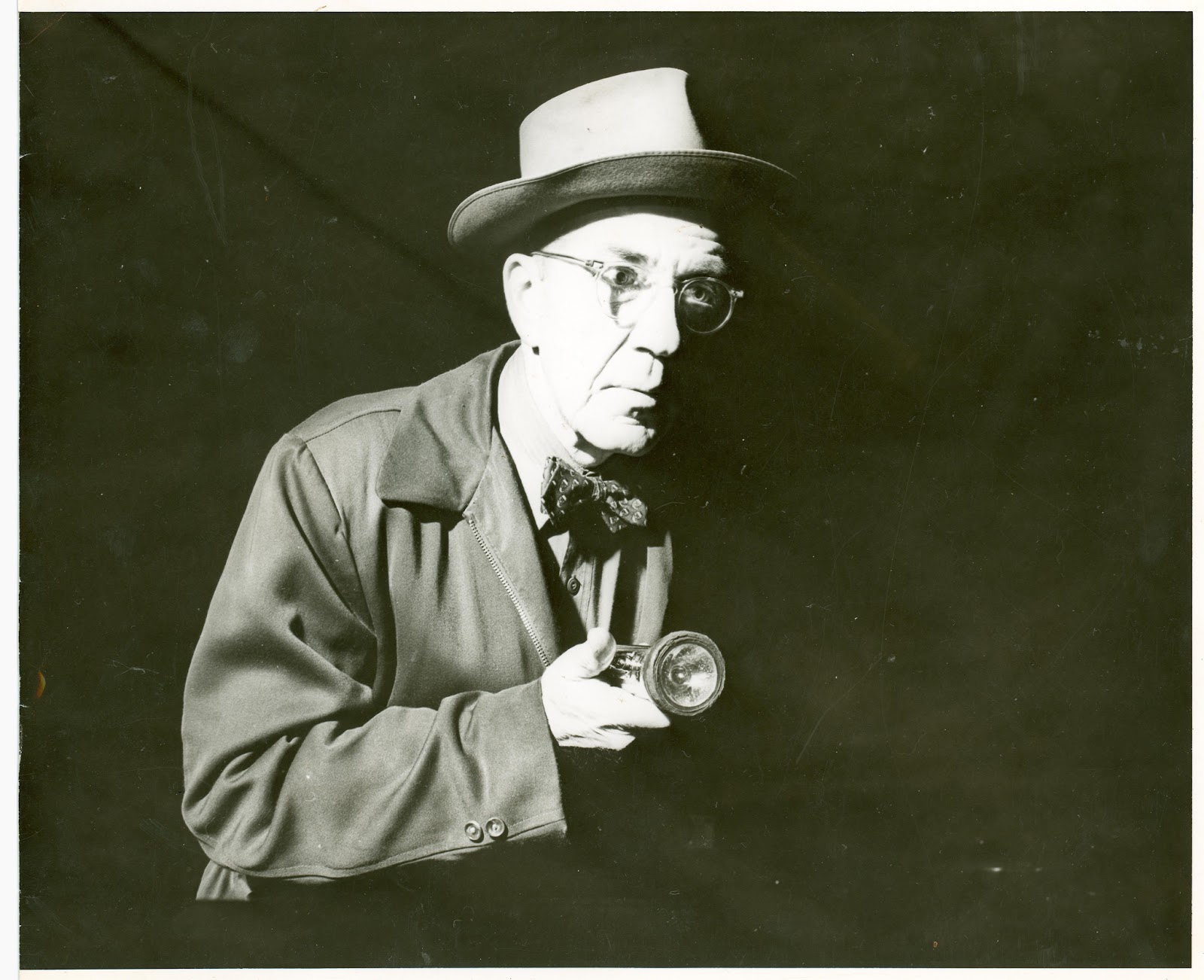
Cop Linker on patrol.
Davidson’s mid-century campus security concerns seem quaint today. Although Linker did occasionally investigate external threats—notably tracking down a notorious burglar of East Coast college dormitories in 1954 (Warlick, Tom. “Linker’s Hunch Pays Off; Fields Awaits Jury Action,” Davidsonian, 12 Feb 1954, p. 1)—most of his duties appear to have been policing student behavior. Parking tickets, alcohol consumption, and amorous indiscretions were his bread and butter. In fact, he reported that on average he broke up three romantic encounters each night of a dance weekend (Duggin, Ervin. “Sixty-Three Weekends: That’s Cop’s New Record,” Davidsonian, 21 Oct 1960, p.1). He recounted his approach:
I’m not trying to make romance unpopular….It’s the natural thing to do. But we’ve got to obey the rule. You won’t find that rule in the handbook. It’s just understood…Most boys think I get a kick out of seeing how many I can catch, but I’m always hesitant. Usually I tap my truck horn and flick the lights, then drive on slowly. If they don’t move I come back, and then maybe there’s some talking done (Duggan).
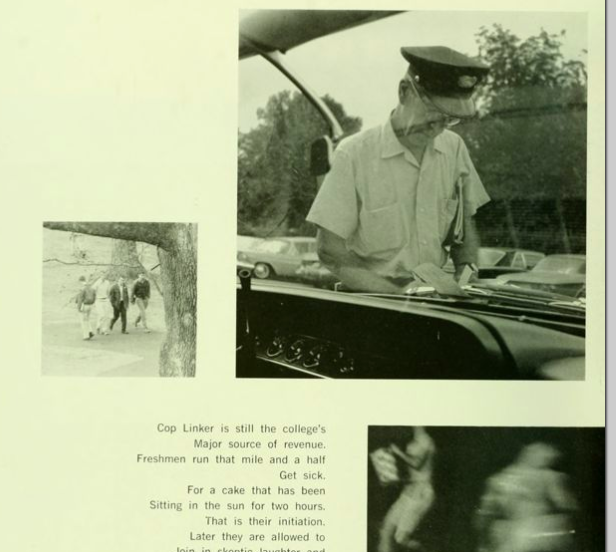
Cop Linker’s parking tickets were lamented in the 1966 Quips and Cranks.
Generations of Davidson “gentlemen” and their dates came to know, fear, and love Cop Linker. In fact, the 1950 edition of Quips and Cranks was dedicated to this “phantom of the night” (14-15), an honor typically reserved for college presidents, deans, or long-time faculty members. One can find numerous photographs, anecdotes, and depictions of Linker in Davidsonians and Quips and Cranks alone.
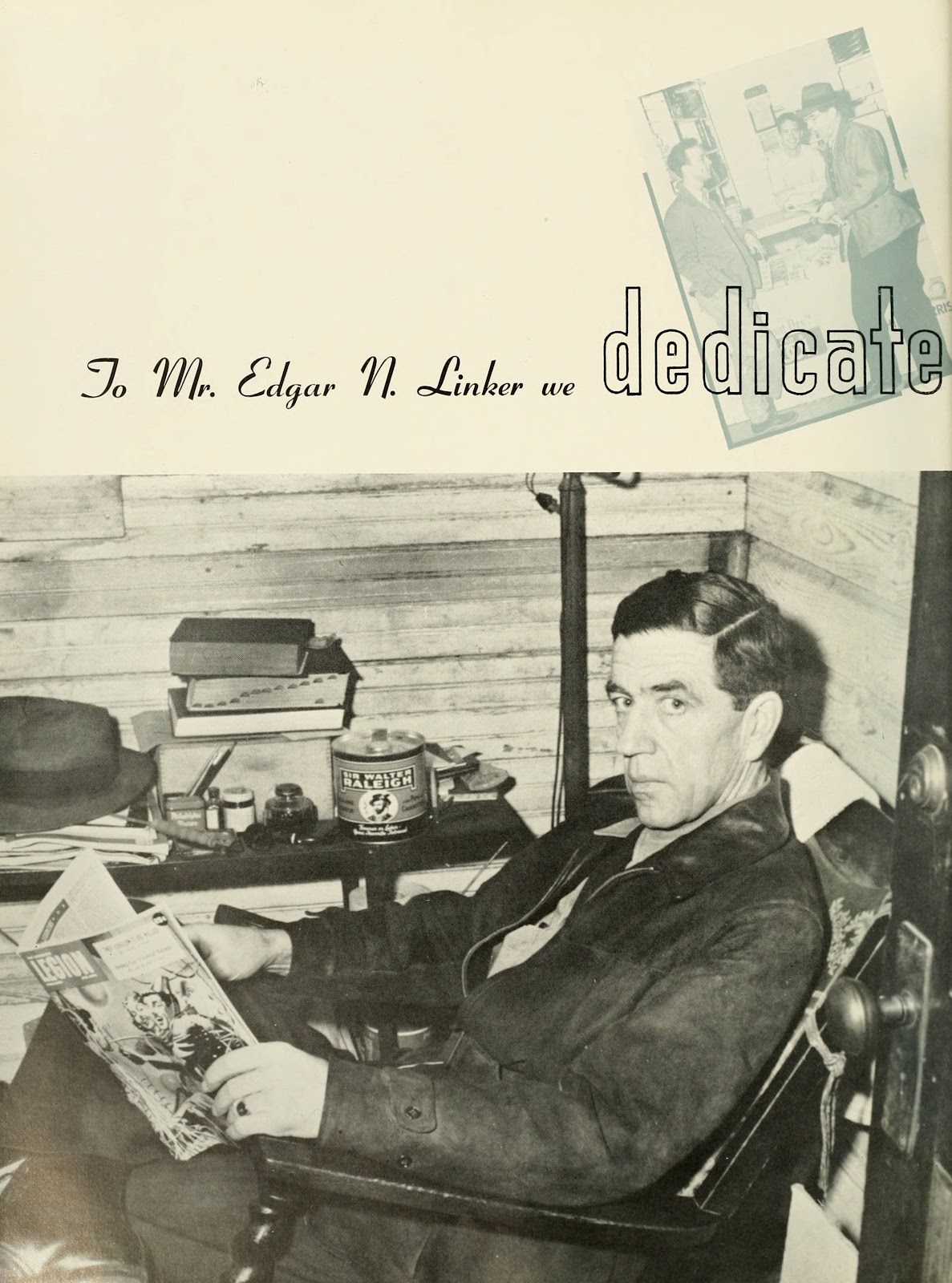

Quips and Cranks 1950
As cultural mores and college rules relaxed, Linker’s job grew more challenging. In Duggin’s profile, Cop complains, “One thing about this modern generation. They don’t need a dark place to do their kissing. They’ll do it most anywhere.” In fact, Cop Linker’s retirement in 1972 seems to represent an official acquiescence to canoodling and a turn towards a more crime-oriented campus security force. After Linker’s departure, the College negotiated a contract with the town’s police force that eventually led to the establishment of Precinct #2, an expanded, college-focused force (McLawhorn, Dennis. “Davidson Precinct Institutionalizes Security Force,” Davidsonian, 21 Jan 1977, p. 6). In 1978, Precinct #2 was spun off into the autonomous campus police force that still exists today (Summie, Salley. “Davidson Police Department Divides,” Davidsonian, 27 Jan 1978, p.1).
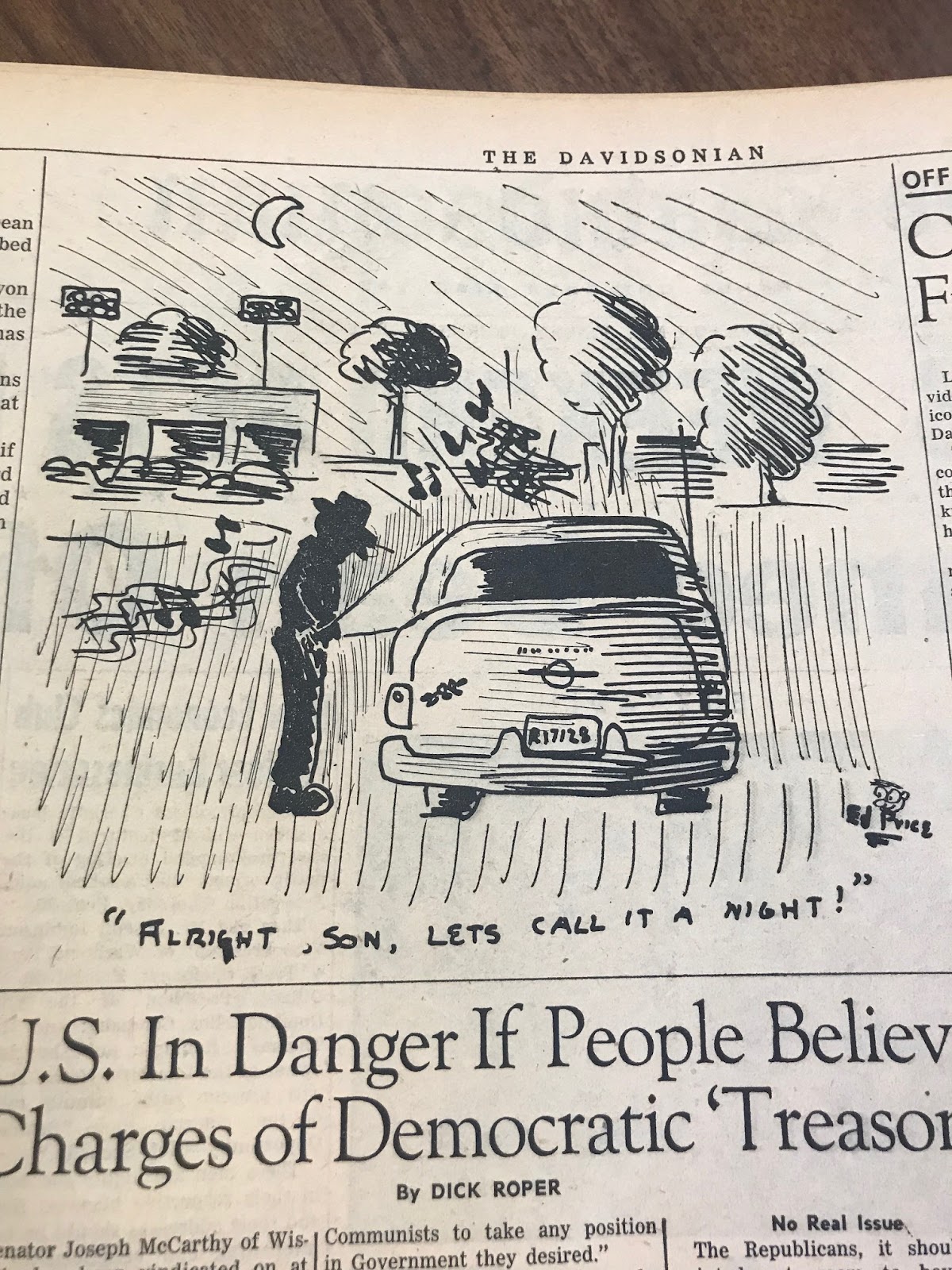
Price, Ed. “Alright, son, let’s call it a night!” Davidsonian, 19 Feb 1954, p. 2.
But who was Ed Linker? Research in the archives of institutions beyond his beat reveals a life more nuanced than what figures in the Davidson imaginary. We were surprised to learn that the State Archives of North Carolina holds the Edgar N. Linker Papers! A subset of their Military Collection, Linker’s papers are primarily letters written to his family in Mooresville while he was serving in the Navy during World War I. Linker served on the cruiser the U.S.S. Des Moines, and the majority of his letters were posted while the ship was in port along the United States’ Atlantic Coast. Linker writes about his time in the Navy, as well as about his family’s experience with the 1918 Spanish Influenza pandemic. Linker’s papers from the U.S.S. Des Moines are the only known complete set of World War I correspondence from the ship, and include an original menu from its 1918 Thanksgiving meal.
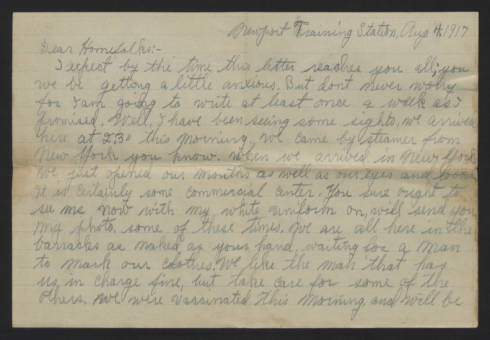
One of Linker’s letters home mentions his vaccination against the 1918 flu pandemic.
The archives of Linker’s church, Davidson College Presbyerian, are housed at Davidson College and also provide some information about the Cop’s life. After returning from the service, he married and ran a dry cleaning business in the Main Street space now occupied by the Soda Shop. In an article written upon his retirement, the author explains, “Mature citizens don’t have to be told why his business stopped [in 1932]; the ‘Hoover Years’ had descended on the land” (Gee, “It’s ‘Cop’ Linker….No More!,” Scrapbook, Davidson College Presbyterian Church Women of the Church Collection). It appears Linker then served as a police officer for the Town of Davidson; a 1939 Davidsonian article about his hiring mentions that he had previously been the department’s head (“Watchman Named,” Davidsonian, 12 Oct 1939). Linker was also a 50-year Mason, and enjoyed beekeeping and gardening at his home on Davidson’s South Street .
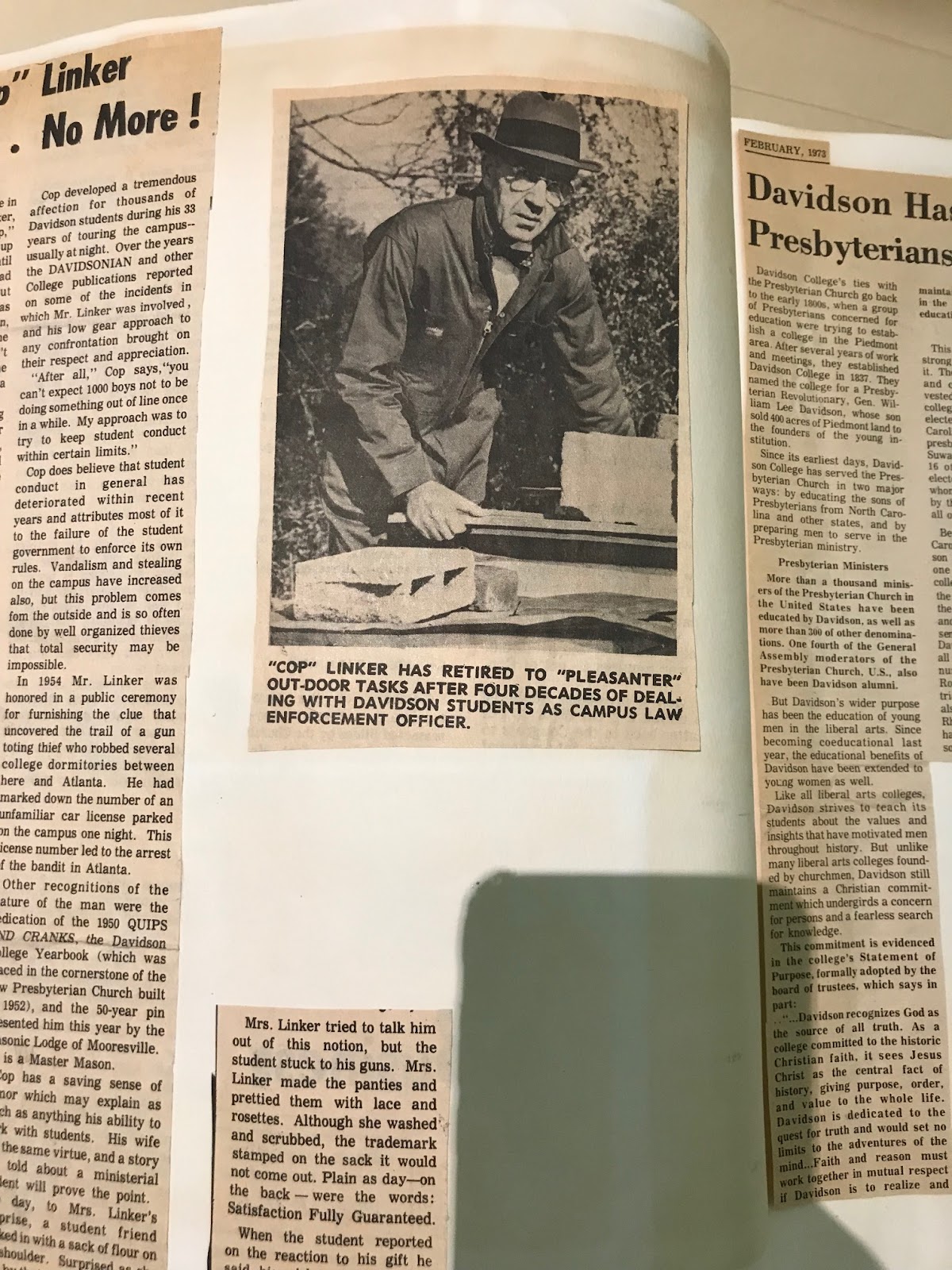
Clipping from the DCPC Women of the Church Scrapbook
Gee’s article mentions Cop Linker’s fine sense of humor, which no doubt went a long way during more than 40 years of policing undergraduate hijinks. In 1960, he admitted:
Freshmen of course are the ones you get the most kick out of. You have to tell them we don’t allow mixed car parties on dance weekends. I say, “About bedtime, sonny,” and sometimes they ask, “Well where can we park?” Doggone! That’s already supposed to be settled.”
Doggone, indeed! Cheers to a Davidson legend—and a veteran, civil servant, businessman, and beekepeer.

Speak Your Mind